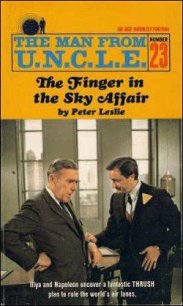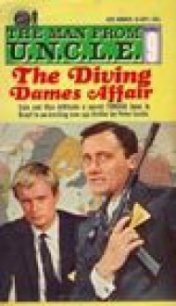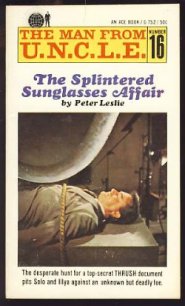[The Girl From UNCLE 04] - The Cornish Pixie Affair - Leslie Peter (читать книги полностью без сокращений бесплатно .TXT) 📗
Mark Slate caught April by the arm when they had crossed rather more than two-thirds of the harbour. "The moon's going to slide out again in a moment," he murmured. "Let's just scan the terrain before we go on— just in case."
As the undulating sand was slowly flooded with pale light, they saw that the line of footprints they were following had taken on a sharper definition between the black shadows of boats. They circled a depression still full of sea water, crossed a sandbank and disappeared into a black chasm between two blue fishing boats propped against the jetty on the far side.
There was no sign of movement and no sound above the distant noises of wind and surf.
"We'll have to chance it," Slate muttered. "Keep apart from me and swerve as you run, in case our gentleman friend is between those boats with his gun at the ready."
"I did the defensive techniques course, too," the girl reminded him with a smile. "Which brings me to another point: do we know it is a gentleman?"
"If you'd been slammed against that booth as I was," the agent said ruefully, "you wouldn't give it a second thought! No woman could have done that, not even an Amazon — it wasn't judo or karate, but sheer, brute strength."
They looked at each other in the moonlight and April nodded. Together, they sprinted for the shadows beneath the far wall.
But no flames lanced the dark; no explosion thundered from the salty blackness shrouding the space between the fishing boats with their high stern cabins. Evidently, their adversary wasn't waiting to dispute the day: he was pressing on.
On the wet sand under the bulging sides of the boats, the footprints ceased. Mark tutted in exasperation. "Blast!" he said irritably. "He could have gone anywhere now. Either doubled round behind the hulls of these trawlers, climbed the wall, or even gone to earth in one of the boats. A number of people — and not only fishermen — do live on them."
April shook her head. Mutely, she pointed at the great squares of masonry which formed the jetty. At the top, where the moonlight silvered the stones above the shadows of the boats, a rope ladder with wooden rungs was draped over the edge. It was still swinging slowly from side to side.
Mark swarmed up and stood on the jetty listening, his head on one side. After a moment, he shrugged and called down:
"Not a sight nor a sound of him. I can't hear anything up here but wind and waves. There's a network of little streets on the far side of the wall here, just beyond the fish market. He could be in any of them, waiting. Or he could have got away altogether. I'm afraid we'll have to give it up; we're just that little too late..."
Slowly, he climbed down again and the two of them began to walk back across the ridged sand. When they reached the trough of sea water which remained in the lee of the other pier, there was a soft swirling noise and a wavelet curled past them up the channel, to spend itself by the steps leading back to the inn.
"Tide's turned," Slate commented as a second small surge of water swept past them. "Look at the gap between the piers. The foam's just that little bit higher than it was a few minutes ago, see! In a quarter of an hour, another channel will creep round behind those dinghies there and join this one by the steps, making this sandbank we're on into an island. In a half hour, the whole floor of the harbour will be covered."
"We'd better get out quick, then," the girl said. "I don't particularly want these boots full of water! How deep is the water in the harbour at high tide?"
"Between fifteen and eighteen feet, I believe, according to the season. But don't worry, we're all right for a few minutes."
"Mark!" There was a sudden urgency in April's voice. "Look! There!"
The agent turned and stared in the direction of her pointing finger. "What is it?" he asked. "Where? I don't see any thing."
Another swirl of water, more copious than the first two, rippled past them. A wavelet broke over his shoe and sank slowly into the sand.
"In the channel... No, nearer. There! Just where the waves are breaking by the entrance. Don't you see?"
And then suddenly he did see. As each wave broke outside the harbour, rolled in between the piers and sent a further swirl of water up the channel, it nudged something floating on the surface a little nearer the wall. Something large and black and heavy. Something that rolled sluggishly in the shallow water every time a new wavelet moved it nearer...
Before they realised it, they were running along the edge of the channel towards the gap. When they had almost reached the thing, Mark dashed ahead and waded out into the channel to get hold of it.
A higher wave creamed into the harbour, a second crest hissing on its back, to break just short of Slate and soak him to the waist. The channel was now appreciably wider.
"Look out, Mark! " April called. "You'll be bowled over."
"It's... all right," he panted. "It's a nuisance getting wet, but it helped me... get this... to the edge." His breath labouring with exertion, he splashed back to the side of the channel and hauled the floating object up on to the sand. "You were right," he said grimly. "There's something about the way they lie, isn't there? You can always tell..." Bending down, he rolled the flotsam over.
Above the waterlogged black jersey and trousers, the puffed and livid face of Ephraim Busustow's eldest son turned limply up and stared sightlessly at the moon.
CHAPTER EIGHT: "ALL THE BEST LIGHTHOUSES ARE HOLLOW!"
"His hands were still tied together behind his back when we found him," Mark Slate told April the next afternoon. "And Curnow is fairly convinced that his ankles and knees had been tied when he was actually killed — though, of course, he'll have to wait until the pathologist's report for confirmation."
"Then it's definitely murder, as we thought," the girl said. "And I suppose that rules out whoever it was that we were chasing. He could hardly have been pilfering my kiosk and killing that man at the same time!"
"Not at the same time — but the fact that it's murder doesn't rule him out, according to Curnow. The police surgeon thinks he was killed quite a long time before the tide brought him to our notice."
"He wag drowned, though?"
"Oh, yes. No doubt about that. In a particular nasty fashion, my superintendent believes — he said that, from the marks and bruises they had found on the body, and from certain discolorations which occur after a drowning, he thought the poor chap had been hog-tied, hand and foot, and then held up by his ankles with his head and shoulders below the surface of the water. As you know, no amount of struggling overcomes that."
"How dreadful, Mark. Out at sea, I suppose?"
"Yes. They think he was probably lured aboard a boat on some pretext, overpowered when they were well out to sea, and then killed. If they'd fed him, bound, over the edge of a small boat head first, and then just held his ankles at the level of the gunwale, it wouldn't take more than a few minutes to drown him."
"It seems somewhat elaborate," she commented.
"Oh, I don't think there was any doubt that they had meant to make it appear like accident or suicide. He hadn't been hit on the head or drugged or anything — that's why they think he was lured aboard; either that or he knew and had no reason to suspect his killers... Whoever was holding the feet would simply have taken out a knife and sawn through the ankles bonds as soon as the struggles ceased, and then cut the ropes around the knees, and finally leaned over to sever the binding at the wrists — only it was further to lean, it was rough as you'll recall, and he muffed it."




![[The Girl From UNCLE 01] - The Global Globules Affair - Latter Simon (е книги .txt) 📗](/uploads/posts/books/56868/56868.jpg)